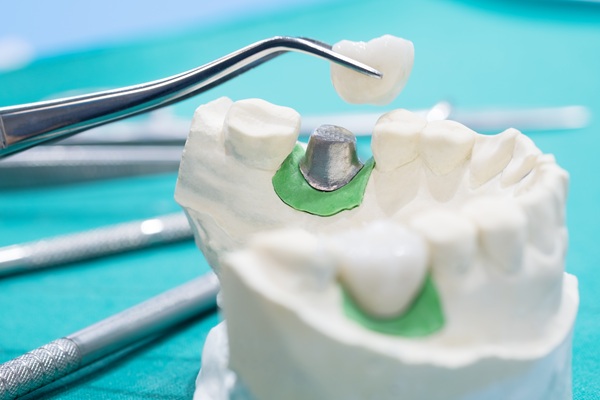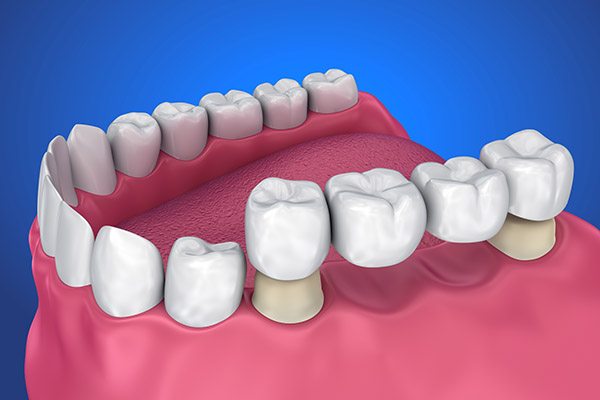How Implant Crowns Can Restore Your Smile

Missing teeth can make chewing, speaking, and even smiling difficult. Implant crowns are a long-lasting solution that can help restore a smile's function and appearance. These crowns look and feel like natural teeth, giving people the confidence to enjoy their daily lives without discomfort.
What are implant crowns?
As their name suggests, implant crowns are traditional crowns attached to a dental implant. The crown's design is like a cap that completely engulfs a portion of the implant. It is a custom-made appliance comprising porcelain or composite materials, both of which can be color-matched to the patient's surrounding natural teeth. The dental implant comprises two parts: the post and the abutment. Both pieces comprise titanium material.
Why choose implant crowns
Implant crowns are a great option for anyone missing one or more teeth. Losing a tooth can lead to more than just an empty space in the mouth—it can affect how the jawbone functions. Without a tooth root to stimulate it, the jawbone can begin to shrink over time. A dental implant acts like a real tooth root, keeping the jawbone strong and preventing bone loss.
Implant crowns also help restore oral function. Missing teeth can make chewing food difficult and uncomfortable. An implant crown fills that gap, helping the teeth work together properly. They are secure, so there is no slipping or shifting while eating or talking. Cosmetically, implant crowns improve the look of the smile. The crown is made to match the surrounding teeth, so it blends in naturally. This makes it easier for people to smile and feel confident.
Getting approved for implant crowns
The ideal candidate for implant crowns is someone with good overall oral health and enough jawbone density to support the dental implant. Healthy gums are essential since gum disease or infections can compromise the success of the implant. If gum issues are present, they must be treated before the implant process can begin.
Those who have lost teeth due to decay, injury, or wear often benefit the most from implant crowns from a periodontist or oral surgeon. A strong jawbone is necessary because the implant post must fuse securely with the bone. In cases where bone loss has occurred, additional treatments like bone grafting can help prepare the area to support an implant.
People who practice good oral hygiene are also excellent candidates. Proper brushing, flossing, and regular dental visits are necessary to keep the implant crown and surrounding gums healthy long-term. Additionally, candidates should be in good general health, as conditions like uncontrolled diabetes or smoking can impact healing and the overall success of the implant procedure.
The implant crown process
Note that the implant crown process requires multiple procedures and appointments. After approval, patients can attend their first appointment. The peroidontist opens the gumline and drills a hole to place the dental implant's post into the jawbone. Over the next few months, the post fuses with the jawbone in a process called osseointegration, creating a strong, stable foundation for the crown.
Once the implant is secure, the periodontist places an abutment on top of it, which involves reopening the gumline. The abutment connects the implant to the crown. Another round of healing will ensue, but it should only last a few weeks. For the final appointment, the practitioner will affix the custom crown to the abutment by bonding it into place.
This process can take six to nine months to complete. The exact timeframe will depend on the patient's healing abilities and whether they adhere to the practitioner's care instructions between appointments. These instructions can range from diet changes to oral hygiene.
Caring for implant crowns
Care does not stop once the implant crown process is complete. Taking care of implant crowns is similar to caring for natural teeth. Brushing twice and flossing once daily are important for keeping the implant, crown, and surrounding gums clean and healthy. Using a soft-bristled toothbrush and non-abrasive toothpaste helps prevent damage to the crown.
Regular dental checkups are also important. The practitioner will monitor the implant and surrounding tissues to ensure everything remains in good condition. Professional cleanings help remove any buildup of plaque or tartar that may affect oral health.
It is also a good idea to avoid chewing on hard items like ice or pens, as this can damage the crown. For those who grind their teeth at night, wearing a mouthguard can help protect the implant crown from wear and tear.
Restore your smile
Implant crowns are a proven solution for restoring the look and function of missing teeth. They provide a durable, natural-looking replacement that blends seamlessly with surrounding teeth. By keeping the jawbone strong and supporting proper oral function, implant crowns improve oral health, function, and aesthetics. For those ready to restore their smile, contact SmileWell Family Dentistry to schedule a consultation.
Request an appointment here: https://smilewellsouthbay.com or call SmileWell Family Dentistry at (310) 904-6375 for an appointment in our Torrance office.
Check out what others are saying about our services on Yelp: Implant Crowns in Torrance, CA.
Recent Posts
Many people resort to using dentures instead of dental implants in managing tooth loss. Dentures may restore the look of the lost tooth or teeth, but they do not compare to implants. Many dentists may recommend shifting to implants. The goals are to increase comfort and improve function. If you want to know how to…
Dental implants and bridges can both be used to replace one or multiple missing teeth. Having multiple missing teeth can put a dent in one’s oral health. Patients who have lost a lot of teeth not only have trouble chewing but even smiling while out in social gatherings.The world of dentistry has evolved so much…
Dental implants have emerged as the standard for replacing missing teeth in general dentistry. These artificial teeth roots can last a lifetime once placed in the jaw. About 5 million new implants are placed each year.Implants can be used to restore front teeth and any other type of teeth. Implants installed in the front of…
Dental implants are among the most popular missing teeth replacement options available in general dentistry. They are the only oral prosthetics that replace missing teeth and their roots, which means they preserve bone tissues in the jaw. Bone tissue loss typically takes place when teeth fall out due to the bone tissues not getting the…


